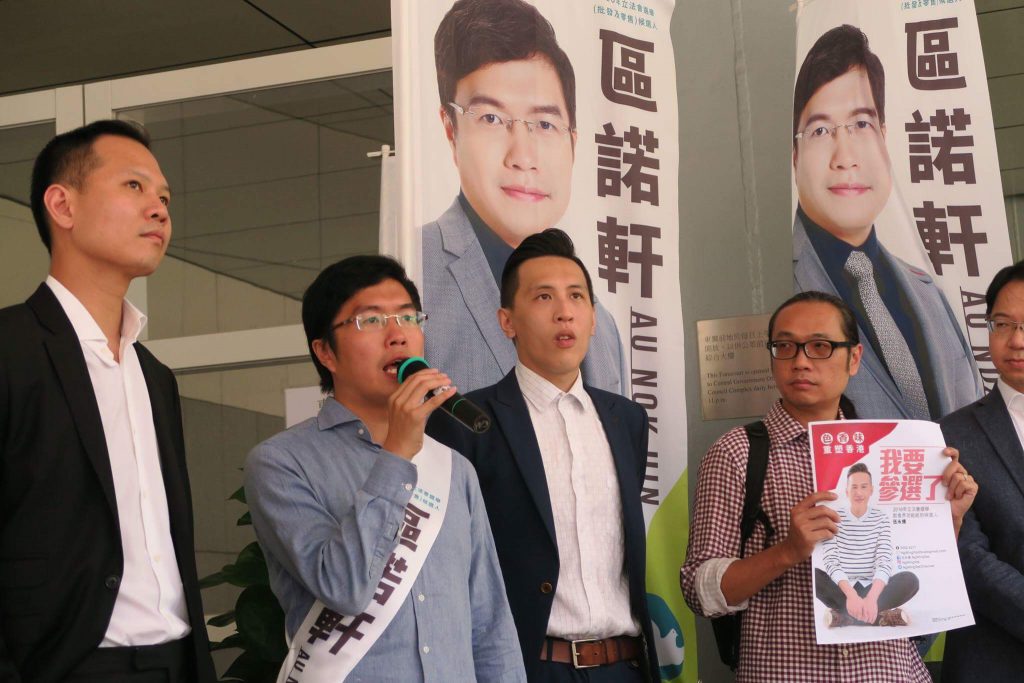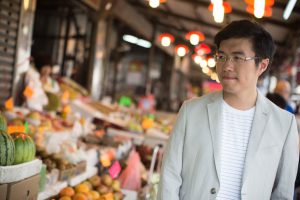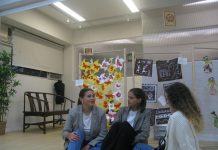Another area where Au has sought to work with other political parties and groups is on opposition to Link Real Estate Investment Trust (Link REIT). Ironically, his activism on this issue has invited criticism from those who berate him for being a member of the Democratic Party, which they point out voted in favour of establishing Link REIT in 2005. Au finds this exasperating. “Dude, that was a long time ago, before I even joined the party!” he exclaims.
Au’s opposition to Link REIT for driving up retail rents and driving out small businesses from housing estate malls became one of the reasons he decided to stand for election in the Legislative Council’s wholesale and retail functional constituency last year. Au says that as part of the move to challenge the establishment on multiple fronts after the Umbrella Movement, he and some like-minded democrats looked at the functional constituencies. He noted that the wholesale and retail seat had been unchallenged for a long time and had a relatively large voter base. It was also a sector to which he had a connection due to his family’s clothing retail business. He took six months to join his family’s company and become first an elector, then a candidate in the constituency. It was the first time a pan-democrat had stood. Although Au’s loss was unsurprising, he did well to win more than a third of the votes cast.

Au says he did struggle a little over using his family’s company as the springboard for his bid but in the end his campaign did not hurt relations with his family. On the contrary, he says, he feels he has a deeper understanding of the sector and of the plight of small businesses in Hong Kong, especially in light of the high rents.
Au sees an ideal community as one where everyone can settle down and get on with their pursuits. “In an ideal community, you’d be able to have a space when you want to open a small store. You deserve this kind of space, why can’t Hong Kong provide it?”
The community is where the former “angry young man” feels rooted. After seven years in Lei Tung, five as district councillor for Lei Tung I, he feels attached to the local community and the residents. He treasures being able to interact with them directly and listen to what their concerns are.
Au says his office is like a community centre where residents just drop in to chat. He says he was a little unnerved when DAB rivals opened an office in the neighbourhood and handed out bags of rice to the residents. “I thought ‘ah, we can’t compete with them in terms of benefits, not by a long shot’,” Au recalls. But then a funny thing happened, he continues. The residents took the rice and then all came in to chat in his office. They were commenting on how small the bags of rice were and about the offering of freebies for political favours.
“If your bonding with the neighbourhood association is strong, the challenge of bribes doesn’t really matter,” says Au.
And he does have bonds in the community. Au is moved when he talks about witnessing the changes in the community in the past five years. “I saw many residents forming their families and I saw many of the supportive residents pass away,” he says.
Au says he is invited to many funerals and that he has helped a lot of residents to write their wills. He is bemused by how this has become one of his unofficial jobs as a district councillor. He reckons he has helped residents make around 250 wills, possibly more than the lawyer who taught him how to do it.
“Maybe it’s by word of mouth. People keep asking me for help in making a will. Four copies are waiting for me this week,” says Au. But he’s not complaining – he thinks this kind of service is putting his motto of “making district work the priority” into practice.
“It’s all about treating people with sincerity. This is how I get along with the residents.” Describing how he maintains his district work, he says the first thing is to have personal interactions by standing in the street. The second is to provide online channels for those who prefer to find him this way.

After seven years in politics, Au is thankful to community work and to the residents he serves for keeping him grounded. He sees being detached, or literally in Cantonese “off the ground”, as a danger that affects both those in the establishment and the democratic camp.
“An important thing community [work] has taught me is the meaning of ‘detached’, it’s when you don’t think what the residents are thinking,” says Au. “For people to ‘buy’ what you say, it has to resonate with how they really see society. And what you need to give people is a direction to articulate how to make a change. That’s what a politician needs to be able to do.”
Edited by Eunice Ip






































